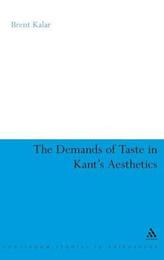
|
The Demands of Taste in Kant's Aesthetics
Hardback
Main Details
| Title |
The Demands of Taste in Kant's Aesthetics
|
| Authors and Contributors |
By (author) Dr. Brent Kalar
|
| Series | Continuum Studies in Philosophy |
|---|
| Physical Properties |
| Format:Hardback | | Pages:192 | | Dimensions(mm): Height 234,Width 156 |
|
| Category/Genre | Philosophy - aesthetics |
|---|
| ISBN/Barcode |
9780826488909
|
| Classifications | Dewey:111.85 |
|---|
| Audience | | Professional & Vocational | |
|---|
|
Publishing Details |
| Publisher |
Bloomsbury Publishing PLC
|
| Imprint |
Continuum International Publishing Group Ltd.
|
| Publication Date |
15 October 2006 |
| Publication Country |
United Kingdom
|
Description
Typically philosophers have either viewed beauty as objective and judgments of beauty as universally valid, or else they have viewed beauty as subjective and regarded judgments of beauty as merely private preferences. Immanuel Kant is famous for his unique third path. Kant argues that beauty is subjective, but the judgment of taste about beauty is capable of universal validity. In his view, the beautiful is not a feature of objects themselves, but merely represents the way we respond to objects. Furthermore, the judgment of taste about beauty is a merely 'aesthetic' judgment - i.e., one based on a feeling of pleasure we take in the object. The judgment of taste, on the other hand, possesses 'universal validity': to call something beautiful is implicitly to 'demand' that all others find it beautiful as well. Kant's views about the taste for the beautiful have long been the subject of controversy. Scholars have differed over the interpretation of the demand contained in a judgment of taste and whether Kant's attempt to legitimate this demand is successful. Brent Kalar argues that the demands of taste should be understood as involving a uniquely aesthetic normativity rooted in Kant's cognitive psychology. If the basis of aesthetic pleasure in the activity of the cognitive faculties is properly understood, then Kant's attempt to legitimate the demands of taste may be regarded as a success. This leads Kalar to give a new interpretation of the nature of the beautiful according to Kant that re-examines the relationship between 'free play' and the 'form of purposiveness' in Kant's aesthetics, and restores the 'aesthetic ideas' to their rightful centrality in Kant's theory.
Author Biography
Brent Kalar received his PhD from Harvard University (Adams Prize, 2003), and is now Associate Professor of Philosophy at the University of New Mexico, USA.
ReviewsBook mentioned. -- Chronicle of Higher Education 'The clarity of Kalar's book, its evenness of temperament throughout its writing, confident without bullying, straightforward without over-simplifying, generous and judicious in its references, make it a trustworthy and congenial companion for the journey through Kant's texts, and a reliable guide in assessing much of the secondary literature that defines and advances the current state of play in academic discussions about Kant's conception of beauty.' Stanley Cavell, Emeritus Professor, Harvard University * Blurb from reviewer *
|